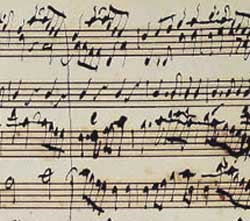
“Comfort, comfort my people,” says your God. “Speak tenderly to Jerusalem. Tell her that her sad days are gone and that her sins are pardoned. Yes, the Lord has punished her in full for all her sins.” Listen! I hear the voice of someone shouting, “Make a highway for the Lord through the wilderness. Make a straight, smooth road through the desert for our God.”
“Fill the valleys and level the hills. Straighten out the curves and smooth off the rough spots.”
“Then the glory of the Lord will be revealed, and all people will see it together. The Lord has spoken!” —Isaiah 40:1-5, NLT
Messiah begins with a fast-paced and regal overture that reminds me of trumpeters announcing the arrival of a king. Handel uses this expectant music to prepare us for the first words of the oratorio, the words of God himself, taken from the prophet Isaiah.
“Comfort my people,” says the Lord. “Speak tenderly to Jerusalem.” This first vocal number is sung by a tenor in a style called a “recitative,” a narration. The song is heartfelt and simple — just a lone voice accompanied by strings and harpsichord. The music builds in power as it comes to an abrupt end with the command from Isaiah 40:3 to “make a straight highway in the desert for our God.”
The tenor soloist continues with a jubilant “air,” joined at this point by the entire orchestra. He repeats Isaiah 40:4 over and over again, as though he is a crier going from town to town announcing the Good News of God’s coming: “Every valley shall be exalted, every mountain and hill made low. The crooked (places shall be made) straight and the rough places plain.”
When the air is finished, the entire chorus takes up Isaiah 40:5 in one of Messiah’s best-known and most triumphant pieces, “And the glory of the Lord shall be revealed, and all flesh shall see it together, for the mouth of the Lord hath spoken it.”
Isaiah foretells the triumphal arrival of God in Jerusalem. Christians believe this passage predicts the birth and ministry of Jesus Christ. Thus, all four Gospels refer early on to this same passage of prophecy when they discuss the ministry of John the Baptist. Here is how Matthew puts it:
In those days John the Baptist began preaching in the Judean wilderness. His message was, “Turn from your sins and turn to God, because the Kingdom of Heaven is near.” Isaiah had spoken of John when he said, “He is a voice shouting in the wilderness: ‘Prepare a pathway for the Lord’s coming! Make a straight road for him!’ —Matthew 3:3, NLT
One of the interesting things about Isaiah 40 is the way it confounds the notion that there are two Gods in the Bible: the fierce and angry God of the Old Testament; and the merciful and loving God of the New Testament.
The language of Isaiah shows us a God who is tenderhearted towards his people. “Tell Jerusalem not to be sad any longer. I have pardoned her sins. I am coming to her in person. Get ready to receive your God.” God wants to close the distance between himself and us.
God’s justice demands punishment for sin. But God is also merciful. He himself has satisfied our debt to justice through the redeeming work of Jesus Christ.
On the cross, the true Glory of the Lord was revealed for all to see.
Photo credit: Original Messiah manuscript, British Library



